■ Click on title
Programmed Research A01: “Present”
-
 How the brain constructs event orders in the mental present
How the brain constructs event orders in the mental present- Principal Investigator
- Shigeru Kitazawa
Prof., Grad. Sch. of Frontier Biosciences, Osaka Univ.
-
- Co-investigator
- Tamami Nakano
Associate Prof., Grad. Sch. of Frontier Biosciences, Osaka Univ. - Co-investigator
- Toshimitsu Takahashi
Assistant Prof., Grad. Sch. of Frontier Biosciences, Osaka Univ. - Co-investigator
- Masanori Saruwatari
Assistant Prof., Grad. Sch. of Medicine, Osaka Univ. - Co-investigator
- Takanori Uka
Associate Prof., Faculty of Medicine, Juntendo Univ.
In the physical world, the present represents a single point in time. Conversely, our conscious experience of the “present” has a width, however small, and a flow within the width of less than 1 s. Thus, the “mental present” is not the same as the “physical present” and must be regarded as an interpretation of the world that is constructed by the brain from the most recent inputs from the physical world. Here, we raise a question as to how the brain constructs the mental present. We especially attend to subjective temporal order and its reversal within short intervals. For example, the temporal order of individual tactile stimuli delivered to each hand at an interval of 0.2 s is often perceived as occurring in the inverse order when an individual’s arms are crossed. The subjective order of successive visual stimuli delivered just prior to the onset of saccadic eye movements should be similarly inverted. We investigated the neural mechanisms underlying these temporal illusions by applying psychological and neurophysiological techniques to humans and monkeys and thereby clarifying how the brain applies order to events in the mental present.
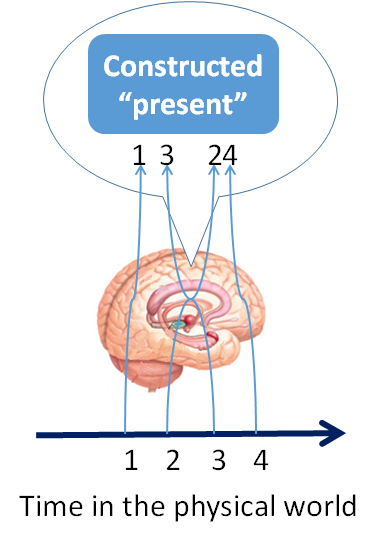
-
 Cognitive mechanisms underlying our mental durations, synchronizations, and clocks
Cognitive mechanisms underlying our mental durations, synchronizations, and clocks- Principal Investigator
- Ikuya Murakami
Associate Prof., Grad. Sch. of Humanities and Sociology, Univ. of Tokyo
-
- Co-investigator*
- Yuko Yotsumoto
Associate Prof., Grad. Sch. of Arts and Sciences, Univ. of Tokyo
The space surrounding us with vivid reality is actually an illusion created by our brains. Likewise, the apparent duration of event A, the temporal order of events A and B, and the time that has elapsed since we closed our eyes are all experienced as vivid reality but are actually the products of information processing in the brain. This study uses psychophysical and noninvasive functional brain imaging experiments to investigate the subjective present in our conscious experiences, which include mental durations experienced for a few seconds or less, temporal relationships among different sensory attributes and modalities, and a psychological clock measuring mental time in the present. Psychological constructs related to the subjective present likely involve calibrations among mental variables and between mental and physical variables. The goal of this study is to understand the mechanisms of such calibrations.

Programmed Research A02: “Past”
-
 Mechanisms underlying memory-driven chronognosis
Mechanisms underlying memory-driven chronognosis- Principal Investigator
- Yuji Ikegaya
Prof., Grad. Sch. of Pharmaceutical Sciences, Univ. of Tokyo
-
- Co-investigator
- Hiroshi Nomura
Assistant Prof.., Grad. Sch. of Pharmaceutical Sciences, Univ. of Tokyo - Co-investigator
- Shigeyoshi Fujisawa
Team Leader, Brain Science Institute, RIKEN
Memory drives time. This insight derives from the clinical fact that patients with memory deficits often lose their sense of the passage of time and cannot identify the present time. Our research project focuses on the following two issues. (1) We aim to study the mechanisms underlying time modulation during ripples. Ripples are transient, high-frequency oscillations in the hippocampus and are believed to contribute to offline memory replay, and therefore, memory consolidation. We will investigate how neurons are selectively reactivated during ripples and how neural information is transformed through this reactivation. (2) We aim to study the mental time of animals. Episodic memory is fundamental to the self-consciousness of humans and mediates mental time travel. However, it is unknown how the brain has developed the concept of “when,” which is one of the factors that support episodic memory, through long-term evolution. We will explore time sensations in mice and rats by monitoring their learning behaviors.
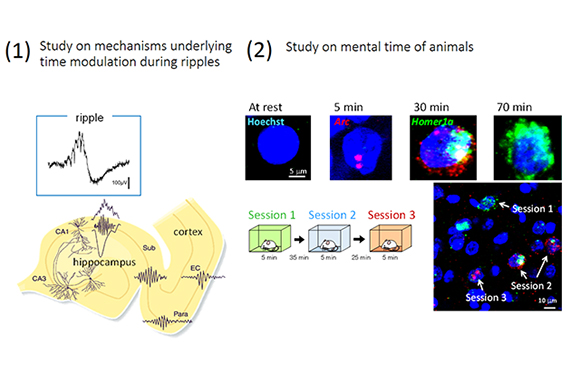
Programmed Research A03: “Future”
-
 Neural mechanisms of temporal monitoring and prediction
Neural mechanisms of temporal monitoring and prediction- Principal Investigator
- Masaki Tanaka
Prof., Grad. Sch. of Medicine, Hokkaido Univ.
-
- Co-investigator
- Jun Kunimatsu
Assistant Prof., Grad. Sch. of Medicine, Hokkaido Univ.
We often think of the future. Our research project aims to elucidate the underlying neural mechanisms of temporal monitoring and prediction using monkeys that are trained on two behavioral paradigms. In one paradigm, the animals detect stimulus omission in a series of isochronous repetitive stimuli, for which the brain is expected to generate prediction error signals within the cerebro-cerebellar networks in response to the stimulus absence. In the other paradigm, the monkeys monitor elapsed time from an external cue and make predictive eye movements as the predetermined interval expires. We will examine neuronal activity in the basal ganglia and the cerebellum that may regulate anticipatory signals reported in the thalamus and the cortex. The performance of the subjects with cerebellar degeneration in similar behavioral tasks will also be examined. These studies will advance our understanding of the mental mind that unconsciously predicts future events and is disrupted in many neuropsychiatric disorders.
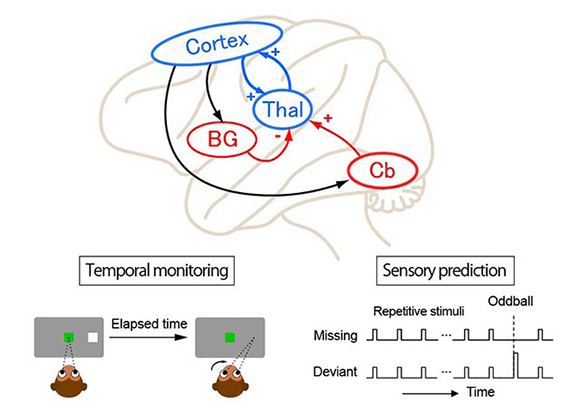
Programmed Research A04: “Pathological Conditions”
-
 Towards a neuropsychological hypothesis of mental time
Towards a neuropsychological hypothesis of mental time- Principal Investigator
- Mitsuru Kawamura
Prof., Sch. of Medicine, Showa Univ.
-
Our aim is to clarify both the pathology of and therapy to be used for disorders of subjective mental time. After elucidating the neural basis of the perception of the past and present, we will analyze the episodic amnesia experienced by Alzheimer patients and their brain lesions. We will also target epileptic amnesia. Temporal lobe epilepsy produces disorientation, very long-term retrograde amnesia, and accelerated forgetting. These unique disorders of mental time may help us discover how subjective mental time passes. We believe prospective memory is critical in accessing future mental time. We know that the temporal lobe manages the “content” and that the anterior lobe manages the “existence” of prospective memory. We will compare the symptoms and lesions of Parkinson’s disease (with its attendant anterior lobe dysfunction) and Alzheimer’s disease (with its attendant temporal lobe dysfunction). We will also explore patients’ neural representations of time.
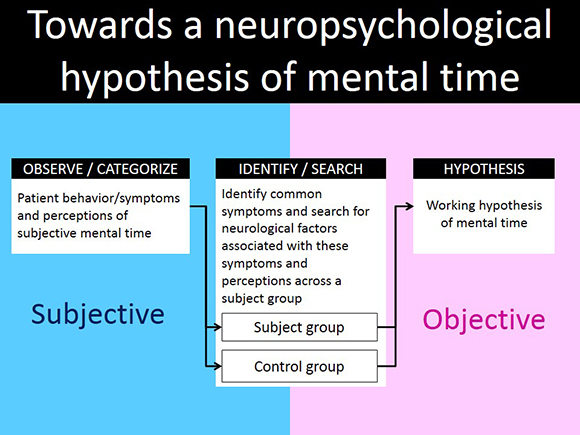
Programmed Research B01: “Linguistics and Philosophy”
-
 Verbalizing time
Verbalizing time- Principal Investigator
- Yukio Otsu
Prof., Faculty of Languages and Cultures, Meikai Univ.
-
- Co-investigator*
- Yuji Nishiyama
Professor Emeritus,Institute of Cultural and Linguistic Studies, Keio Univ. - Co-investigator*
- Noriko Imanishi
Prof., Grad. Sch. of Humanities and Sociology, Univ. of Tokyo - Co-investigator*
- Takashi Iida
Prof., College of Humanities and Sciences, Hihon Univ. - Co-investigator*
- Masayuki Komachi
Associate Prof., Faculty of Humanities and Social Sciences, Shizuoka Univ. - Co-investigator*
- Tamami Shimada
Associate Prof., Faculty of Languages and Cultures, Meikai Univ.
It is difficult to understand “how the concept of time is expressed in the human language” by simply positing a “past-present-future” schema. To understand such “time verbalization,” we need to take into account the existence of a “linguistic module” that internalizes grammatical mechanisms for tense and aspect, as well as non-linguistic modules, such as “pragmatic ability.” To better understand how humans deal with time, we set the following goals:
- (1) to elucidate the properties of the modules involved in time verbalization in terms of language universals and diversity,
- (2) to shed new light on the developmental process of the modules involved in time verbalization through experimental studies and studies using spontaneous child language corpora,
- (3) to understand the relationship between cognitive systems and the neural system from a philosophical point of view.
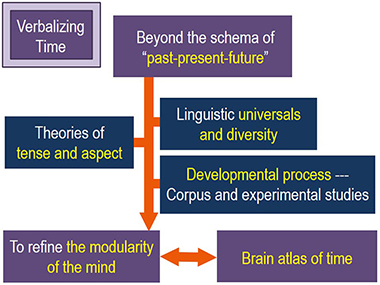
Programmed Research C01: “Comparative Ethology”
-
 Mental time travel in apes
Mental time travel in apes- Principal Investigator
- Satoshi Hirata
Prof., Wildlife Research Center, Kyoto Univ.
-
- Co-investigator
- Ikuma Adachi
Assistant Prof., Primate Research Institute, Kyoto Univ. - Co-investigator
- Naruki Morimura
Program-specific Associate Prof., Wildlife Research Center, Kyoto Univ. - Co-investigator
- Shinya Yamamoto
Associate Prof., Graduate School of Intercultural Studies, Kobe Univ. - Co-investigator
- Fumihiro Kano
Program-specific Assistant Prof., Primate Research Institute, Kyoto Univ. - Co-investigator
- Yumi Yamanashi
Program-specific Assistant Prof., Wildlife Research Center, Kyoto Univ.

Humans can think about events in the distant past and imagine the remote future. In other words, we can travel from the past to the future in our minds. Researchers have begun to discuss these phenomena using the coined term “mental time travel.” One hypothesis claims that the ability to engage in mental time travel is uniquely human and is not shared by non-human animals. However, only a few such studies exist using non-human animals, and this hypothesis is purely speculative. The present project investigates how time is recognized by chimpanzees, bonobos, and orangutans, using various experimental approaches. The project’s aim is to clarify the evolutionary foundations of the ability to engage in mental time travel by investigating episodic-like memory and future planning behaviors in apes. Additionally, we will explore the characteristics of mental time in apes by using experimental procedures including eye-tracking and touch-screen tasks.
(* funded co-investigator)


